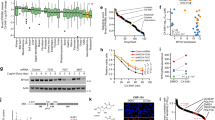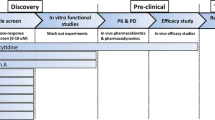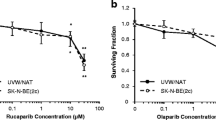Abstract.
Purpose: BBR 3464 is a promising new trinuclear platinum complex that has been shown to circumvent the resistance to cisplatin in a panel of tumor cell lines and xenografts with acquired or intrinsic resistance to cisplatin. The in vitro and in vivo antitumor activity of BBR 3464 was evaluated and compared with that of cisplatin in neuroblastoma. Methods: In in vitro studies, the short- and long-term cytotoxicities, cell cycle perturbations, the ability to induce apoptosis, the intracellular platinum accumulation and DNA platination were evaluated in three neuroblastoma cell lines exposed to appropriate drug concentrations for 1 h. In in vivo studies, BBR 3464 was administered i.v. at doses of 0.30 and 0.35 mg/kg three times at intervals of 4 days (q4d×3), and cisplatin was administered i.v. according to two different schedules (at 2 and 4 mg/kg three times at intervals of 4 days and at 6 and 12 mg/kg as single doses). Results: In a short-term growth inhibition assay, BBR 3464 was shown to be up to 100-fold more potent than cisplatin and it was even more potent in a clonogenic assay. The difference in the antitumor effect of BBR 3464 on the different cell lines was evident in both assays, while cisplatin exerted a comparable antitumor activity in all lines tested. Cell cycle analysis demonstrated a longer-lasting block in G2/M phase induced by BBR 3464 without the early S phase accumulation induced by cisplatin. The higher potency of BBR 3464 appeared to be unrelated to the induction of apoptosis, that was lower or at most comparable to cisplatin. Cellular platinum accumulation and platinum-DNA adduct formation following BBR 3464 exposure was higher than following cisplatin exposure. These differences may have resulted from a different mechanism of action and may explain the lack of cross-resistance with cisplatin. In xenografts of neuroblastoma, BBR 3464 was confirmed to be very potent as compared to cisplatin (MTD 0.35 mg/kg and 4 mg/kg for BBR 3464 and cisplatin, respectively). The efficacy of BBR 3464 was superior to that of cisplatin when both drugs were administered on a fractionated schedule (q4d×3), while BBR 3464 appeared equally active to 12 mg/kg cisplatin administered as a single dose. Conclusions: Our findings indicate that BBR 3464 has a definite antitumor effect in neuroblastoma lines and may be a candidate for early clinical trials in children with neuroblastoma.
Similar content being viewed by others
Author information
Authors and Affiliations
Additional information
Electronic Publication
Rights and permissions
About this article
Cite this article
Riccardi, A., Meco, D., Ferlini, C. et al. In vitro and in vivo antitumor activity of the novel trinuclear platinum complex BBR 3464 in neuroblastoma. Cancer Chemother Pharmacol 47, 498–504 (2001). https://doi.org/10.1007/s002800000264
Received:
Accepted:
Issue Date:
DOI: https://doi.org/10.1007/s002800000264




